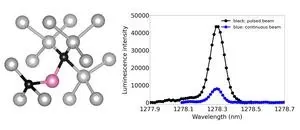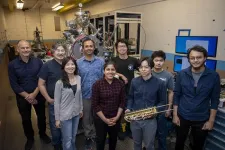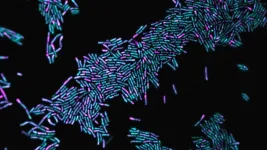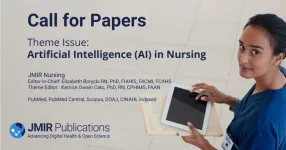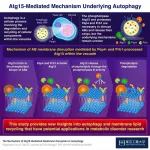(Press-News.org) PHILADELPHIA—(August 22, 2023)—Now, scientists at The Wistar Institute have discovered a potential target for gastric cancers associated with Epstein-Barr Virus; study results were published in the journal mBio. In the paper, Wistar’s Tempera lab investigates the epigenetic characteristics of gastric cancer associated with the Epstein-Barr Virus: EBVaGC. In evaluating EBVaGC’s epigenetics — the series of biological signals associated with the genome that determines whether a given gene is expressed — the Tempera lab highlights a target that could advance as a future treatment for this type of cancer.
The work of Italo Tempera, Ph.D., associate professor in the Gene Expression & Regulation Program in the Ellen and Ronald Caplan Cancer Center, at The Wistar Institute, and collaborators demonstrates that an epigenetically active compound called decitabine disrupts the genome of EBVaGC by epigenetically modifying the cancer’s DNA, a finding that offers the potential for a new approach to treating EBVaGC.
"What we have identified is essentially a self-destruct button within this kind of cancer, and our paper shows that we figured out how to press that self-destruct button," said Tempera. "Normally, a latent virus that reactivates and starts to kill cells is a bad thing. But by switching that viral lytic process back on in these cancer cells by using epigenetic signaling, we're effectively getting the virus to kill the cancer cells that it's responsible for in the first place."
The research — supported by a research program project grant, otherwise known as a P01-series grant, from The National Institute of Health (NIH) — includes scientists from The Wistar Institute, The Coriell Institute for Medical Research and Brigham and Women's Hospital of Harvard Medical School.
In EBVaGC, the cancer cells' DNA is hypermethylated: the DNA contains a high percentage of cytosine with a 5-methyl group attached to it (relative to normal, unmethylated cytosine). As a silencer of gene expression, DNA methylation allows EBV to remain latent. This methylation pattern plays a significant role in regulating the EBV latency-lysis cycle within the cancer cells. DNA methylation, as an epigenetic factor, usually functions as a gene-silencing mechanism, particularly in certain regions of the genome; a methylated gene still exists within the genome — methylation does not delete the genetic information — but methylation can prevent the protein the gene encodes from being transcribed.
To disrupt this epigenetic profile, the researchers turned to decitabine, a compound known for its ability to reduce DNA methylation levels (i.e., to hypomethylate the DNA). Tempera and his co-authors treated two cell lines that were derived from EBVaGC tumors with decitabine. The cell lines that received the treatment demonstrated massive reductions in DNA methylation across the genome relative to the control as assessed by a variety of epigenetic assay techniques.
In observing the effects of decitabine treatment on EBVaGC, Tempera’s team found a significant disruption of the cancer’s epigenetic profile. The EBV genome within EBVaGC treated with decitabine resulted in widespread, mostly uniform hypomethylation of the EBVaGC epigenome (with a few regional exceptions). Tempera and his co-authors discovered that the hypomethylating effect of decitabine treatment reactivated the lytic cycle of the latent EBV in the cancer cells. Because lysis is lethal to cells, the epigenetic reactivation of lysis within gastric cancer associated with EBV offers a promising potential treatment for the specific subset of EBVaGC.
“Now we know that we can use the epigenome of Epstein Barr Virus against the gastric cancer that it affects — that’s an exciting potential cancer therapy we have as a result of investigating the interplay between epigenetic patterns and disease lifecycle,” explained Tempera.
Co-authors: Sarah Preston-Alp, Lisa Beatrice Caruso, Chenhe Su, Samantha S. Soldan, Davide Maestri, Andrew Kossenkov, Giorgia Napoletani, Paul M. Lieberman and Italo Tempera of The Wistar Institute; Kelsey Keith and Jozef Madzo of The Coriell Institute for Medical Research; and Benjamin Gewurz of Brigham and Women’s Hospital of Harvard Medical School.
Work supported by: National Institutes of Health (NIH) grants P30 CA010815, R01 AI130209, R01 GM124449, P01 CA269043, R01 DE017336, R01 CA259171, R01 CA09360, R01 AI1535086, R01 AI164709, R01 CA228700, U01 CA275301, R50 CA211199 and T32 CA09171.
Publication information: “Decitabine disrupts EBV genomic epiallele DNA methylation patterns around CTCF binding sites to increase chromatin accessibility and lytic transcription in gastric cancer” from mBio.
###
The Wistar Institute, the first independent, nonprofit biomedical research institute in the United States, marshals the talents of an international team of outstanding scientists through a culture of biomedical collaboration and innovation. Wistar scientists are focused on solving some of the world’s most challenging and important problems in the field of cancer, infectious disease, and immunology. Wistar has been producing groundbreaking advances in world health for more than a century, consistent with its legacy of leadership in biomedical research and a track record of life-saving contributions in immunology and cell biology. wistar.org.
END
Wistar researchers discover potential target for gastric cancers associated with Epstein-Barr virus
2023-08-22
ELSE PRESS RELEASES FROM THIS DATE:
Advances in quantum emitters mark progress toward a quantum internet
2023-08-22
– By Alison Hatt
The prospect of a quantum internet, connecting quantum computers and capable of highly secure data transmission, is enticing, but making it poses a formidable challenge. Transporting quantum information requires working with individual photons rather than the light sources used in conventional fiber optic networks. To produce and manipulate individual photons, scientists are turning to quantum light emitters, also known as color centers. These atomic-scale defects in semiconductor materials can emit single photons of fixed wavelength or color and allow photons to interact with electron spin properties in controlled ways.
A team ...
Scientists create 3D models of freshwater mussels to help save them from extinction
2023-08-22
Scientists and imaging specialists have teamed up to help save one of the world’s most endangered groups of animals: freshwater mussels. With funding provided by the U.S. Fish and Wildlife Service’s National Conservation Training Center, imaging experts will create 3D shell models based on specimens from the Florida Museum of Natural History and the Smithsonian Institution’s National Museum of Natural History.
Once complete, the models will be available online for free to educate the public about these amazing yet little-known creatures that ...
How bacteria surf cargo through the cell
2023-08-22
Bacteria live in nearly every habitat on earth including within soil, water, acidic hot springs and even within our own guts.
Many are involved in fundamental processes like fermentation, decomposition and nitrogen fixation. But scientists don’t understand a fundamental process within bacteria cells: how they organize themselves before division.
Driving vs. surfing
When cells divide the cell splits into two “daughter cells” with the same genetic material as the original cell.
During this process, the DNA and other cellular components replicate, and then this “cargo” ...
JMIR Nursing Call for Papers Theme Issue on Artificial Intelligence (AI) in Nursing
2023-08-22
JMIR Nursing Editor-in-Chief: Elizabeth Borycki RN, PhD, FIAHIS, FACMI, FCAHS and theme editor Kenrick Dwain Cato, PhD, RN, CPHIMS, FAAN welcome submissions to a special theme issue examining "Artificial Intelligence (AI) in Nursing."
AI is revolutionizing health care. Nurse informaticist developers, researchers, practitioners, clinicians, educators, and innovators have designed, developed, implemented, and used AI to support patients, their families, nurses and health care activities.
AI has been used to support ...
New study sheds light on the molecular mechanisms underlying SLC29A3 disorders
2023-08-22
In humans, the SLC29A3 gene regulates the function of lysosomes to control waste recycling in cells such as macrophages (that engulf and destroy foreign bodies). This gene encodes for the lysosomal protein that transport nucleosides — degradation products of RNA and DNA — from lysosomes to the cytoplasm. Loss-of-function mutations in the SLC29A3 gene lead to aberrant nucleoside storage, resulting in a spectrum of conditions called SLC29A3 disorders. These disorders can manifest in the form of pigmented skin patches, enlargement of the liver/spleen, hearing loss, or type 1 diabetes. A key manifestation of this group of disorders is histiocytosis, ...
MPFI's Wang Lab awarded $1 million grant to study mechanism behind memory decline in Alzheimer’s
2023-08-22
Max Planck Florida will be able to expand their research program to investigate the neural circuits underlying Alzheimer’s disease with new support. The National Institute on Aging of the NIH has awarded Dr. Yingxue Wang $1,038,819 over three years as part of the Alzheimer’s Disease Initiative Fund. The research will shed new light on how the brain forms new memories and maintains them over time and what can lead to memory decline during Alzheimer’s Disease.
Turning our daily experiences ...
USPSTF recommendation on preexposure prophylaxis to prevent acquisition of HIV
2023-08-22
Bottom Line: The U.S. Preventive Services Task Force (USPSTF) recommends that clinicians prescribe preexposure prophylaxis using effective antiretroviral therapy to persons at increased risk of HIV acquisition to decrease the risk of acquiring HIV. An estimated 1.2 million persons in the U.S. currently have HIV, and more than 760,000 persons have died of complications related to HIV since the first cases were reported in 1981. Although treatable, HIV is not curable and has significant health consequences. Therefore, effective strategies to prevent HIV are an important public health and ...
This fish doesn't just see with its eyes -- it also sees with its skin.
2023-08-22
DURHAM, N.C. -- A few years ago while on a fishing trip in the Florida Keys, biologist Lori Schweikert came face to face with an unusual quick-change act. She reeled in a pointy-snouted reef fish called a hogfish and threw it onboard. But later when she went to put it in a cooler she noticed something odd: its skin had taken on the same color and pattern as the deck of the boat.
A common fish in the western Atlantic Ocean from North Carolina to Brazil, the hogfish is known for its color-changing skin. ...
New antibiotic from microbial ‘dark matter’ could be powerful weapon against superbugs
2023-08-22
A new powerful antibiotic, isolated from bacteria that could not be studied before, seems capable to combat harmful bacteria and even multi-resistant ‘superbugs’. Named Clovibactin, the antibiotic appears to kill bacteria in an unusual way, making it more difficult for bacteria to develop any resistance against it. Researchers from Utrecht University, Bonn University (Germany), the German Center for Infection Research (DZIF), Northeastern University of Boston (USA), and the company NovoBiotic Pharmaceuticals (Cambridge, USA) now share the discovery of Clovibactin and its killing mechanism in the scientific journal Cell.
Urgent need for new antibiotics
Antimicrobial ...
Effect of a Mediterranean diet or mindfulness-based stress reduction during pregnancy on child neurodevelopment
2023-08-22
About The Study: In this randomized clinical trial that included 626 children, maternal structured lifestyle interventions during pregnancy based on a Mediterranean diet or mindfulness-based stress reduction significantly improved child neurodevelopmental outcomes at age 2.
Authors: Francesca Crovetto, M.D., Ph.D., of the University of Barcelona in Barcelona, Spain, is the corresponding author.
To access the embargoed study: Visit our For The Media website at this link https://media.jamanetwork.com/
(doi:10.1001/jamanetworkopen.2023.30255)
Editor’s Note: Please see the article for additional information, including ...

